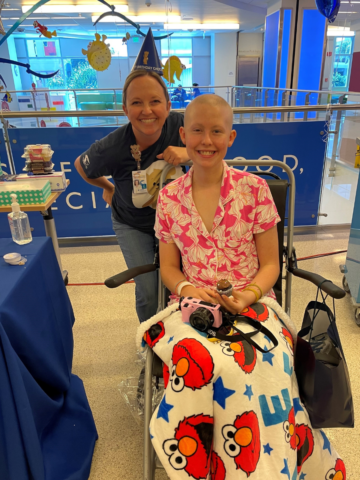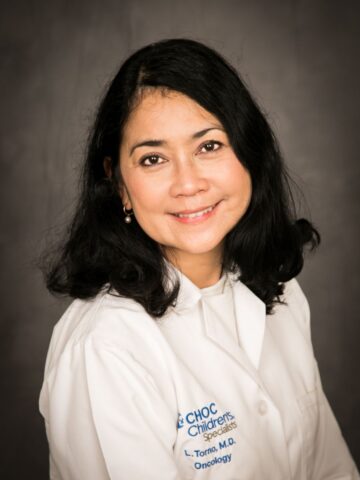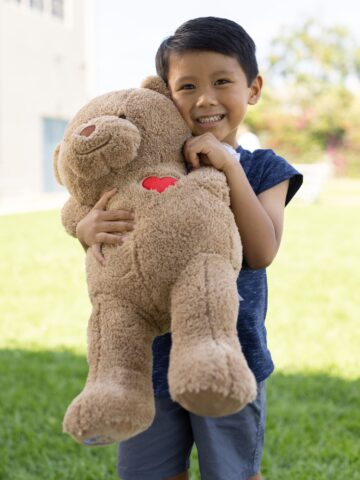Fertility preservation gives young patients with cancer a chance to safeguard their fertility and future motherhood. Ovarian tissue cryopreservation, an innovative method, allows them to preserve fertility before cancer treatment, offering hope for building a family later in life.
Mackenzie Hayward wasn’t thinking much about her future as a mother.
She was only 14, and recently diagnosed with Ewing sarcoma, a rare type of pediatric cancer that forms in bone and soft tissue.
Mackenzie’s perspective changed when Dr. Carol Lin, a pediatric oncologist at the Hyundai Cancer Institute at CHOC, walked into her patient room.
“Would you be interested in preserving fertility by undergoing a procedure to improve your chances of having children in the future?” Dr. Lin asked the young teen.
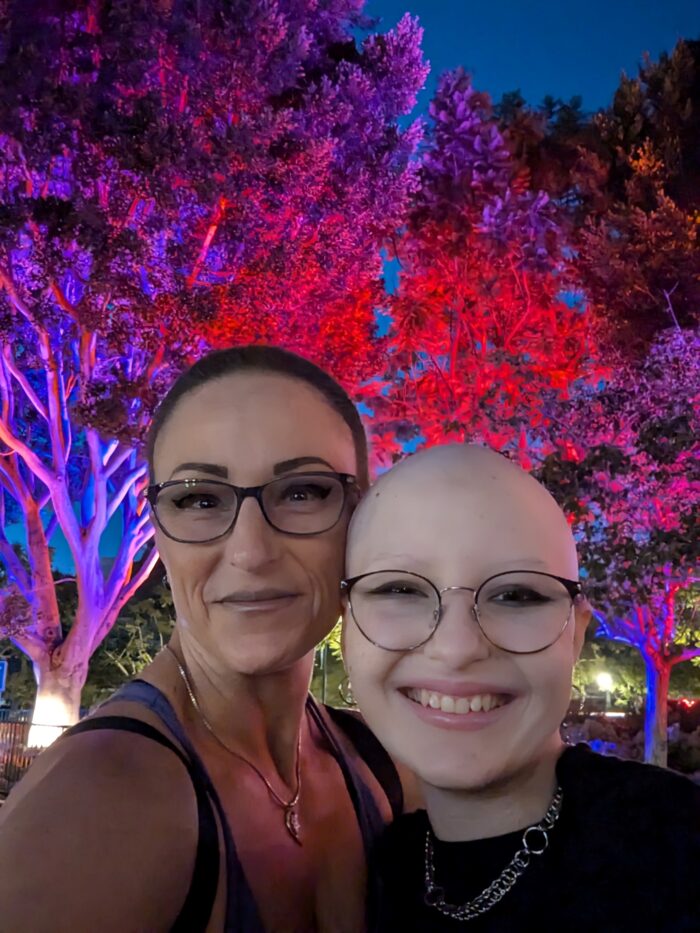
Mackenzie and her mother, Shannon, pondered the question as Dr. Lin explained ovarian tissue cryopreservation (OTC), a procedure in which tissue is frozen for future reimplantation or for growing into a mature egg via in-vitro fertilization.
When thawed and grafted into the host patient, cryopreserved ovarian tissue can potentially restore ovarian activity.
Dr. Lin recommended OTC because of the risk of chemotherapy and radiation to treat the tumor on Mackenzie’s pelvic bone.
A quick decision
Mackenzie opted to go with OTC by having one ovary removed.
It was a quick decision, Mackenzie and Shannon say.
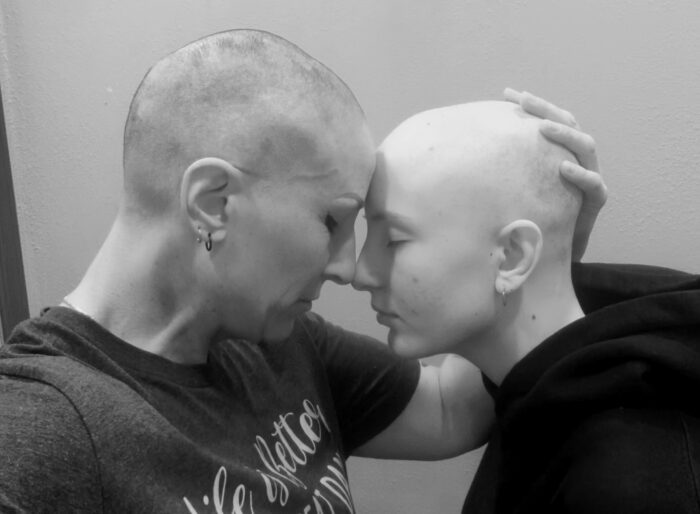
“To hear your child has cancer is devastating,” Shannon says. “It’s heartbreaking – one of the worst things you can think of. At the same time, to know that there’s a program like this that gives young women the opportunity to improve their chances of having kids in the future is wonderful.”
Mackenzie had the procedure done in late April 2024.
“At diagnosis, patients and families may be focused on the disease more than its impact on fertility,” Dr. Lin says. “We know from experience and research that patients and families regret not having a deeper discussion about the possible ways to preserve fertility at the time of diagnosis.”
Side effects
Cancer does not equate to infertility, but it increases the chances of it.
Among childhood cancer survivors aged 20 to 39, three-fourths will experience long-term treatment side effects, studies show.
And compared to their siblings, those who survive childhood cancer are 20% less likely to achieve pregnancy. Compared to age-matched peers who do not experience childhood cancer, childhood cancer survivors achieve pregnancy 38% less frequently.
Growing program
Oncofertility combines the specialties of oncology and reproductive management and research to explore and expand options for the reproductive potential of cancer patients and survivors.
CHOC’s oncofertility team includes nurse practitioners, research coordinators, and physicians in endocrinology, general surgery, reproductive endocrinology and infertility, gynecology, and urology who collaborate with the overall oncology team and the Adolescent and Young Adult (AYA) Program.
All OTC patients at CHOC undergo surgery here and the tissues are sent to the Ann & Robert H. Lurie Children’s Hospital of Chicago, where they are initially preserved.
The first ovarian cryopreservation study opened at CHOC in 2009, and the procedure now is a standard of care for fertility preservation among young patients.
However, because not all insurance companies cover OTC or egg harvesting yet, philanthropic efforts with the help of the CHOC Foundation and generous donors have enabled Dr. Lin’s team to raise money to cover the cost of fertility preservation.
Egg harvesting option
For years, CHOC’s oncofertility program also has offered egg harvesting in partnership with a reproductive endocrinology and infertility (REI) group in Newport Beach.
That program continues to go strong.
Cancer patient Eliza Plascensia’s acute lymphoblastic leukemia had returned after she had recovered from an initial diagnosis when she was 12.
She was weeks away from a bone marrow transplant when Dr. Lin offered her the option to have her eggs harvested.
“It made me think a lot,” says Eliza, then 19 years old.
Eliza underwent the procedure in December 2022 and weeks later had a successful bone marrow transplant.
“The way that Dr. Lin mentioned this issue was so caring,” Eliza says. “I felt comfortable and appreciative of how she educated me about such a personal and potentially life-changing decision.”
Shannon agrees.
“She’s really good about communicating,” Shannon says. “She’s truly kind and friendly at explaining everything so that you have all the information. And you know you can go to her with any questions.”
Thoughts of motherhood
Today, Eliza is a 21-year-old student at Santa Ana College. She plans to become a pediatric nurse after earning a degree in photography.
Down the line, she says she’d love to have children.
“I was thinking of becoming a mom when I turned 25, but I lost so much of my teenage years because of my cancer and I first want to get on track and experience life and focus on school,” says Eliza, who attended The J. Willard and Alice S. Marriott
Foundation CHOC Oncology Ball in 2023 and has participated in the Richard C. and Virginia A. Hunsaker Adolescent and Young Adult Oncology (AYA) Child Life Program to support teens and young adults with cancer
Mackenzie, meanwhile, has more rounds of chemotherapy to undergo.
The creative young teen, who loves to paint and make pottery, plans to start high school in the new year.
“We’re going to beat this,” Shannon says.
Something to look forward to
Recently, Dr. Lin presented at a national conference a poster on CHOC’s oncofertility program.
“We as clinicians need to be better educators upfront, making sure our families understand the risk of infertility with their treatment plans, and the methods to potentially preserve fertility,” Dr. Lin says.
She envisions CHOC’s OTC program could soon grow to 10 or so patients a year. “At CHOC, we always strive to give our oncology patients something to look forward to after their treatment,” Dr. Lin says. “We don’t want to limit their opportunity to have children if this is something they end up desiring.”

